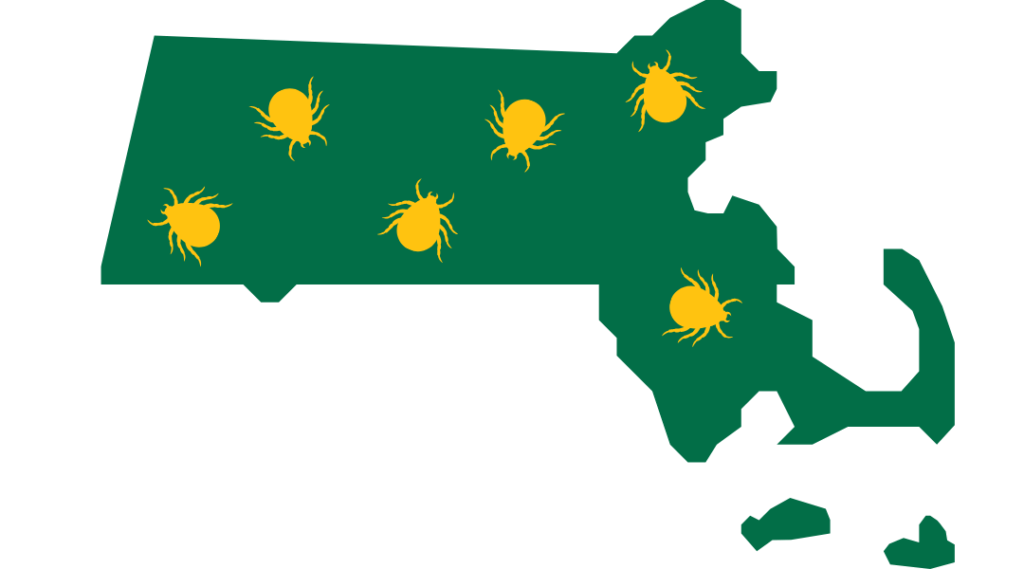
With warmer weather comes a reason for caution. While we’re all eager to enjoy nature after months indoors, dangers can be lurking in the lush green outdoors. One such threat is ticks. Tiny and flightless, these bugs are commonly found in shady, damp, brushy, wooded, or grassy areas—including your backyard.
Ticks don’t fly or jump; instead, they wait for humans or animals to brush past so they can latch on and feed on their blood. According to Mass.gov, ticks can carry serious—and sometimes deadly—diseases, such as Lyme disease, babesiosis, anaplasmosis, tularemia, Rocky Mountain spotted fever, Borrelia miyamotoi, and Powassan virus. Effective tick control is essential for keeping your family and pets safe from these hard-to-detect pests.
Tick Season in Massachusetts
According to Massachusetts tick-borne disease reports, while tick activity can occur year-round, there are notable seasonal trends in Massachusetts, with two peak periods. The first begins in March or April and lasts through August. The second occurs in October and November.
Common Tick Species in Massachusetts
The most common tick species in the state are deer ticks and dog ticks, with lone star ticks present in some areas.
- Deer ticks (also known as black-legged ticks) are responsible for spreading Lyme disease, babesiosis, anaplasmosis, Borrelia miyamotoi, and Powassan virus.
- Dog ticks are known to transmit Rocky Mountain spotted fever and certain types of tularemia.
- Lone star ticks, while not a significant source of human illness in Massachusetts at this time, can carry tularemia, ehrlichiosis, and Southern Tick-Associated Rash Illness (STARI).
Learn more and familiarize yourself with each species’ distinguishing characteristics here.
Tick Activity by Season
Spring:
As temperatures rise, nymphs (a life stage between larva and adult) begin to emerge. About the size of a poppy seed, nymphs pose the highest risk for bites, as they are extremely difficult to detect.
Summer:
With sustained warm weather, tick activity remains high and populations grow, increasing the risk of outdoor exposure.
Fall:
This season sees a second peak in tick activity as adult ticks become active again before the first frost.
Winter:
Although activity declines during the colder months, tick exposure is still possible during mild spells when they become temporarily active.
How to Protect Yourself
You can take several preventative steps to reduce your risk of tick exposure:
- At Home:
- Eliminate tick habitats by clearing leaves and keeping the grass trimmed short.
- Spray for ticks to reduce populations. While DIY treatments are available, hiring a reputable professional service ensures safe application and better results.
- In Outdoor Areas:
- Wear long sleeves and pants, and tuck your pants into your socks to create a barrier. Ticks often attach around the feet and ankles and crawl upward.
- Use insect repellents containing 12–25% DEET. While DEET is safe for children, it should not be used on infants.
- Perform thorough tick checks on yourself, your children, and your pets after returning indoors. Key areas to check include:
- Scalp and hairline
- In and around the ears
- Armpits
- Belly button
- Behind the knees
- Between the legs
- Around the waist
- Additional Tips:
- Take a shower after coming indoors.
- Check clothing and gear, then tumble-dry them on high heat to kill any hidden ticks.
You can read more about preventative measures here.
What Is Tick Control Service?
A tick control service is a professional solution designed to reduce or eliminate tick populations in and around your home or business. This typically involves perimeter and yard treatments using EPA-registered products applied by trained technicians with specialized equipment.
At Shawsheen Valley, we offer both traditional synthetic and all-natural yard treatments to suit your needs. We provide services to North Central and Northeastern Massachusetts, operating in Essex, Middlesex, and Worcester counties.
Protect your family and pets—get a quote for tick control treatment:
https://svmtcontrol.com/#quote